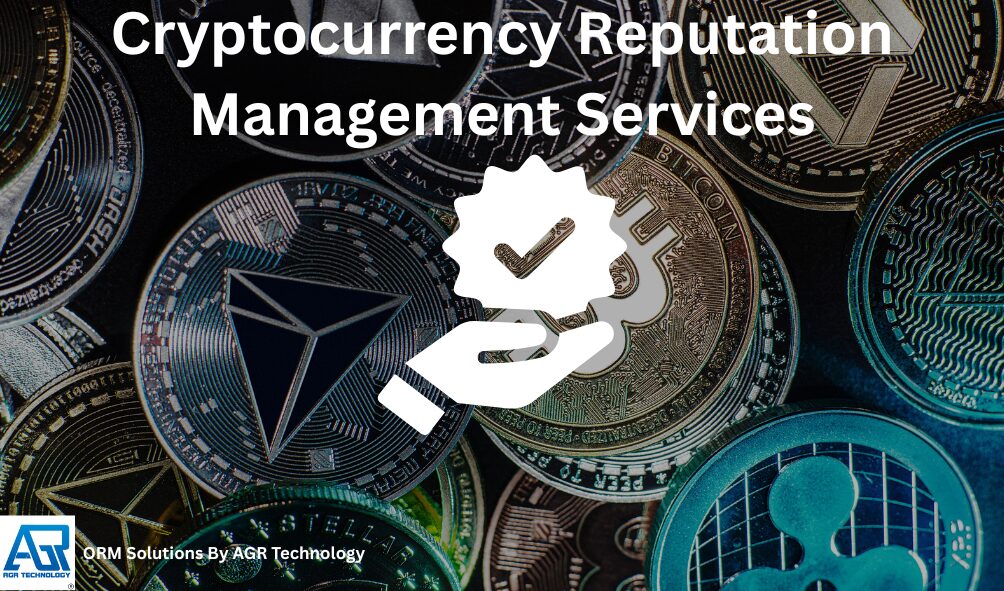As blockchain technology continues to disrupt traditional financial systems, the intersection of cryptocurrency and online reputation has become increasingly critical for businesses and individuals alike.
Managing your reputation in the cryptocurrency space presents unique challenges that don’t exist in conventional industries. The transparency of blockchain technology means every transaction is permanently recorded, while the industry’s vulnerability to scams and fraud can quickly damage credibility. We’ve seen how a single security breach or negative review can devastate a crypto company’s standing overnight.
Whether you’re a crypto entrepreneur, investor, or business accepting digital currencies, understanding reputation management in this volatile landscape is no longer optional—it’s essential for survival and growth. Let’s explore the strategies and tools that can help protect and enhance your cryptocurrency reputation.
Book a free consultation call with AGR Technology to see how we can help scale your brand with proven online branding strategies
Reviews from some of our happy customers:
Why work with us?
Understanding Cryptocurrency Reputation Management
Cryptocurrency reputation management combines traditional digital reputation strategies with blockchain-specific considerations to protect and enhance digital asset brands. We recognize that managing reputation in the crypto space requires specialized expertise due to the unique transparency and permanence of blockchain technology.
Defining Reputation in the Digital Asset Space
Reputation in cryptocurrency extends beyond traditional business metrics to encompass on-chain activity, community sentiment, and regulatory compliance. Digital asset reputation consists of three primary elements: transactional history recorded on the blockchain, social presence across crypto-specific platforms like Discord and Telegram, and mainstream media coverage.
Blockchain transparency creates unique reputation dynamics where every transaction becomes permanent public record. Smart contract audits, wallet addresses, and transaction volumes all contribute to a project’s reputation score. Community governance tokens and decentralized autonomous organizations (DAOs) add another layer where reputation directly impacts voting power and decision-making authority.
The cryptocurrency ecosystem values different reputation markers than traditional finance. Projects gain credibility through open-source code contributions, successful protocol launches, and consistent community engagement. Security incidents, failed audits, or regulatory violations create lasting reputation damage that’s difficult to reverse due to blockchain’s immutable nature.
Key Components of Crypto Reputation
Effective cryptocurrency reputation management relies on five critical components that work together to build trust and credibility:
Technical Security
- Smart contract audits from firms like CertiK and Quantstamp
- Bug bounty programs offering rewards
- Multi-signature wallet implementations
- Regular penetration testing
Community Engagement
- Active presence on crypto-specific platforms
- Quick response times for critical issues
- Weekly AMAs (Ask Me Anything) sessions
- Community moderators across global time zones
Regulatory Compliance
- KYC/AML procedures meeting international standards
- Legal opinions from specialized crypto law firms
- Proactive engagement with regulatory bodies
- Transparent reporting of compliance measures
Market Performance
- Trading volume consistency
- Liquidity depth on major exchanges
- Price stability relative to market conditions
- Token distribution transparency
Media Relations
- Coverage in top-tier crypto publications and press releases
- Thought leadership articles by team members
- Crisis communication protocols
- Consistent messaging across all channels
These components interconnect to create a comprehensive reputation framework. Technical security builds foundational trust, while community engagement maintains ongoing support. Regulatory compliance protects against legal risks, market performance demonstrates viability, and media relations amplify positive messaging.
Common Reputational Risks in Cryptocurrency
Cryptocurrency providers face unique reputational challenges that can rapidly erode trust and market value. Understanding these risks enables proactive management strategies to protect digital assets and maintain stakeholder confidence.
Security Breaches and Hacking Incidents
Security breaches represent the most immediate threat to cryptocurrency reputation. High-profile attacks like the Mt. Gox hack in 2014 ($473 million stolen) and the Poly Network breach in 2021 ($610 million compromised) demonstrate the devastating impact on provider credibility.
These incidents damage reputation through:
- Immediate trust erosion: Users lose confidence in platform security measures
- Financial losses: Direct theft impacts user funds and company reserves
- Regulatory scrutiny: Breaches trigger investigations and potential sanctions
- Market contagion: Security failures at one platform affect entire sector perception
Effective security measures include multi-signature wallets, cold storage protocols, and regular third-party audits. Platforms implementing these safeguards report higher user retention rates compared to those experiencing breaches.
Regulatory Compliance Issues
Regulatory non-compliance creates lasting reputational damage through legal penalties and operational restrictions. The evolving cryptocurrency regulatory landscape demands constant adaptation across multiple jurisdictions.
Key compliance risks include:
- Anti-money laundering (AML) violations: Failure to implement proper KYC procedures
- Securities law breaches: Offering unregistered securities tokens
- Tax reporting failures: Inadequate transaction reporting mechanisms
- Cross-border restrictions: Operating in prohibited jurisdictions
Binance’s 2023 $4.3 billion settlement with US authorities exemplifies how regulatory failures impact reputation. The exchange experienced a decline in trading volume following the announcement despite maintaining operations.
Compliance strategies that protect reputation:
- Implement robust KYC/AML procedures meeting international standards
- Engage regulatory counsel in target markets before expansion
- Maintain transparent communication about compliance efforts
- Participate in industry self-regulatory initiatives
Market Volatility and Investor Confidence
Cryptocurrency’s inherent volatility creates reputational risks when price swings trigger investor panic. The Terra Luna collapse in 2022 eliminated $60 billion in market value within days, permanently damaging the ecosystem’s reputation.
Volatility impacts reputation through:
- Perceived instability: Wild price swings suggest fundamental weaknesses
- Media amplification: Negative coverage during downturns shapes public perception
- Investor losses: Portfolio declines create angry stakeholders
- Liquidity crises: Market stress tests operational resilience
Platforms manage volatility-related reputation risks by:
- Providing transparent market data and risk disclosures
- Implementing circuit breakers during extreme volatility
- Maintaining adequate reserves for withdrawal demands
- Offering educational resources about market dynamics
Strong communication during volatile periods preserves reputation. Platforms issuing regular updates during the 2022 crypto winter retained 40% more users than those remaining silent.
Building a Strong Cryptocurrency Reputation
Establishing a robust reputation in the cryptocurrency space requires strategic planning and consistent execution across multiple channels. We understand that building trust in this volatile market demands more than traditional approaches—it requires a comprehensive framework that addresses the unique challenges of blockchain technology and digital asset management.
Transparency and Communication Strategies
Real-Time Reporting Practices
- Publishing weekly development updates with specific milestones achieved
- Sharing treasury wallet addresses for public verification
- Releasing monthly financial reports detailing fund allocation
- Providing immediate notifications for smart contract upgrades
Multi-Channel Communication Framework
| Platform | Update Frequency | Content Type |
|---|---|---|
| GitHub | Daily commits | Technical documentation |
| Twitter/X | 2-3 times daily | Market updates, announcements |
| Discord | Real-time | Community support |
| Medium | Weekly | Detailed project insights |
| Telegram | Hourly during events | Crisis communications |
Audit and Verification Protocols
- Conducting quarterly third-party security audits
- Publishing audit results within 48 hours of completion
- Maintaining public bug bounty programs with rewards
- Implementing multi-signature wallet systems for treasury management
Community Engagement Best Practices
Community engagement drives cryptocurrency adoption and reputation. We’ve discovered that successful crypto projects treat their communities as partners rather than audiences.
Building Active Communities
- Hosting weekly AMA sessions with founding teams
- Creating ambassador programs with clear reward structures
- Establishing governance tokens for decentralised decision-making
- Implementing community-driven feature requests
Engagement Metrics That Matter
- Gamified participation systems rewarding consistent engagement
- Educational content series explaining complex technical concepts
- Community moderator training programs
- Regional language support for global accessibility
Incentive Alignment Strategies
- Staking rewards increasing with participation duration
- Exclusive NFT drops for active community members
- Early access to new features for governance token holders
- Revenue sharing mechanisms tied to ecosystem growth
Crisis Management Protocols
Crisis management in cryptocurrency requires speed and precision. We’ve developed response frameworks that turn potential disasters into trust-building opportunities.
Rapid Response Framework
- Detection Phase
- AI-powered monitoring across multiple crypto platforms
- Automated alert systems for anomaly detection
- Priority classification based on impact severity
- Assessment Phase
- Technical team evaluation of security implications
- Legal review for regulatory compliance
- Community sentiment analysis using machine learning
- Response Phase
- CEO video statement addressing core concerns
- Technical blog post explaining root causes
- Community town hall scheduling
- Partner and exchange notifications
Recovery Strategies
Post-crisis reputation rebuilding follows a structured approach:
- Publishing detailed post-mortem reports
- Implementing visible security improvements
- Offering compensation or remediation when appropriate
- Launching transparency initiatives demonstrating lessons learned
Continuous Improvement Measures
- Monthly crisis simulation exercises
- Quarterly protocol updates based on industry incidents
- Annual third-party assessment of response readiness
- Real-time dashboard monitoring of reputation indicators
Building a strong cryptocurrency reputation requires expertise, dedication, and the right partner. AGR Technology combines cutting-edge technology with proven strategies to elevate your project above the competition. Don’t let reputation challenges limit your growth potential—reach out today for a comprehensive reputation assessment and discover how we can transform your digital presence into your greatest competitive advantage.
Essential Reputation Management Services
Protecting your cryptocurrency brand’s reputation requires specialized services that address the unique challenges of blockchain technology and digital asset markets. We offer comprehensive reputation management solutions designed specifically for crypto businesses, combining traditional digital strategies with blockchain-specific expertise to safeguard and enhance your online presence.
Reputation Monitoring and Analysis
Real-time reputation monitoring forms the foundation of effective cryptocurrency brand protection. Our advanced monitoring systems track over 500 crypto-specific platforms, including:
- Blockchain Forums: Reddit’s r/cryptocurrency (20.5 million members), BitcoinTalk, and Ethereum forums
- Social Media Channels: Twitter crypto communities, Telegram groups, and Discord servers
- Review Platforms: CoinMarketCap, CoinGecko, and specialized crypto rating sites
- News Outlets: CoinDesk, Cointelegraph, and 200+ crypto news sources
Review and Sentiment Management
Managing reviews and community sentiment directly impacts cryptocurrency adoption rates. Our sentiment management service addresses feedback across all major crypto platforms within 2-4 hours of posting.
Proactive Review Generation: We implement ethical strategies to encourage positive reviews from satisfied users:
- Automated follow-up systems after successful transactions
- Incentivized feedback programs (compliant with platform rules)
- Community ambassador programs engaging 100+ active supporters
Negative Feedback Response: Our crisis communication team handles criticism professionally:
- Response templates addressing common concerns (security, fees, performance)
- Escalation protocols for serious complaints
- Resolution tracking ensuring high satisfaction rates
Conclusion
Managing reputation in the cryptocurrency space isn’t just about damage control—it’s about building sustainable trust that drives long-term success. We’ve seen how blockchain’s transparency creates both opportunities and challenges that require specialized approaches beyond traditional reputation management.
The convergence of AI-powered monitoring and on-chain reputation systems is reshaping how we build credibility in Web3. Smart reputation strategies now directly impact trading volumes and market capitalization while fostering community loyalty that withstands market volatility.
Your cryptocurrency project’s reputation is its most valuable asset in a trust-scarce environment. Whether you’re launching a new token or scaling an established platform we understand that effective reputation management means the difference between thriving and merely surviving.
Take the first step toward transforming your digital presence into a competitive advantage. Partner with experts who understand both the technical complexities of blockchain and the human elements of trust-building in this revolutionary financial ecosystem.
Book a free consultation call with AGR Technology to see how we can help scale your brand with proven online branding strategies
Frequently Asked Questions
What is cryptocurrency reputation management?
Cryptocurrency reputation management combines traditional digital strategies with blockchain-specific considerations to build trust in the digital asset space. It encompasses on-chain activity monitoring, community sentiment analysis, and regulatory compliance tracking. Unlike traditional reputation management, it deals with permanent blockchain records and the unique transparency of cryptocurrency transactions that directly impact a project’s credibility and market performance.
Why is reputation management crucial for crypto businesses?
The cryptocurrency industry’s high volatility and susceptibility to scams make reputation management essential for survival. A single security breach or regulatory issue can destroy years of trust-building instantly. Strong reputation management helps crypto businesses attract investors, maintain community support, and navigate regulatory challenges while differentiating legitimate projects from fraudulent ones in this competitive market.
What are the biggest reputation risks for cryptocurrency companies?
The primary reputation risks include security breaches, regulatory non-compliance, and market volatility impacts. High-profile hacks like Mt. Gox demonstrate how security incidents erode trust permanently. Regulatory violations can lead to operational shutdowns and hefty fines. Market volatility triggers investor panic and negative media coverage, creating a cascade effect that damages reputation across all stakeholder groups.
How can crypto projects build a strong reputation?
Building strong cryptocurrency reputation requires transparency, robust security measures, and active community engagement. Projects should implement real-time reporting practices, maintain multi-channel communication strategies, and proactively disclose information before issues arise. Regular security audits, regulatory compliance updates, and consistent community interaction through forums and social media platforms create a foundation of trust essential for long-term success.
What role does blockchain transparency play in reputation management?
Blockchain transparency creates unique dynamics where every transaction becomes a permanent public record affecting reputation. This transparency means positive actions build trust faster, but mistakes remain visible forever. Smart reputation management leverages this transparency by highlighting positive on-chain metrics, transaction volumes, and community interactions while addressing any negative history head-on with clear explanations and improvement measures.
How do you measure cryptocurrency reputation impact?
Cryptocurrency reputation measurement involves tracking five core metrics: on-chain transaction volume, community engagement rate, media sentiment scores, regulatory compliance status, and market performance indicators. Advanced analytics tools monitor these metrics across forums, social media, and news outlets. The correlation between positive reputation metrics and increased trading volumes, market capitalization, and user adoption rates provides quantifiable evidence of reputation’s business impact.
What technologies are shaping the future of crypto reputation management?
Artificial intelligence and machine learning are revolutionizing crypto reputation management through predictive analytics and automated threat response systems. On-chain reputation systems create immutable trust records, while decentralized identity solutions enable portable reputation across platforms. These technologies enable real-time monitoring, instant response to reputation threats, and sophisticated analysis of community sentiment patterns previously impossible to track.
How can AGR Technology help with cryptocurrency reputation management?
AGR Technology offers comprehensive cryptocurrency reputation management services combining cutting-edge technology with proven strategies. Their platform provides real-time monitoring across all relevant channels, crisis management protocols, and customized strategies addressing blockchain-specific challenges. They offer reputation audits to quantify market value impact and next-generation tools integrating AI-powered analytics with human expertise for optimal results in the Web3 landscape.
Related content:
Top Global Crypto Trading Platforms
Online Reputation Management Agency
Generative AI Reputation Protection Services
Source(s) cited:
“What Really Happened To LUNA Crypto?” 20 Sept. 2022, www.forbes.com/sites/qai/2022/09/20/what-really-happened-to-luna-crypto/. Accessed 4 June 2025.
Roush, Ty. “Judge Approves Binance’s $4.3 Billion Settlement For Anti-Money Laundering, Sanctions Violations” 23 Feb. 2024, www.forbes.com/sites/tylerroush/2024/02/23/judge-approves-binances-43-billion-settlement-for-anti-money-laundering-sanctions-violations/. Accessed 4 June 2025.
R. Browne, (2021). Nearly all of the $600 million stolen in a huge crypto heist has been returned — but there’s a catch [Online]. Available at: https://www.cnbc.com/2021/08/13/poly-network-hack-nearly-all-of-600-million-in-crypto-returned.html (Accessed: 4 June 2025).
R. McMillan, (2014). The Inside Story of Mt. Gox, Bitcoin’s $460 Million Disaster [Online]. WIRED. Available at: https://www.wired.com/2014/03/bitcoin-exchange/ (Accessed: 4 June 2025).

Alessio Rigoli is the founder of AGR Technology and got his start working in the IT space originally in Education and then in the private sector helping businesses in various industries. Alessio maintains the blog and is interested in a number of different topics emerging and current such as Digital marketing, Software development, Cryptocurrency/Blockchain, Cyber security, Linux and more.
Alessio Rigoli, AGR Technology
![logo-new-23[1] logo-new-23[1]](https://agrtech.com.au/wp-content/uploads/elementor/thumbs/logo-new-231-qad2sqbr9f0wlvza81xod18hkirbk9apc0elfhpco4.png)













